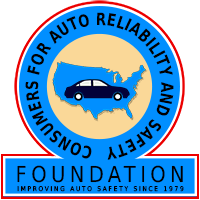The CARS Foundation was originally named Motor Voters, and in 1996 the name was changed to avoid confusion with "Motor Voter" voter registration laws.
Among the CARS Foundation's achievements are:
- Initiating California's auto "lemon law" for car buyers, which became the model for similar laws in all 50 states. State lemon laws require auto manufacturers to repurchase seriously defective vehicles that have not been repaired, violating the manufacturer's express warranty. Often, the defects jeopardize the safety of the vehicle owners, their families, and others who share the roads. Prior to enactment of state lemon laws, companies such as Ford argued that it might take them up to 30 attempts to repair a major defect, before the car owner could seek a refund.
- Being designated by the Federal Trade Commission to represent the public interest in the "Regulatory Negotiation" with the auto industry over whether state lemon laws would be overridden by a federal law that would require mandatory pre-dispute arbitration that would be binding on the consumer. The CARS Foundation played a major role in opposing federal preemption and mandatory pre-dispute arbitration.
- Spearheading promulgation of the following federal motor vehicle safety standards:
- A Federal Rule issued by the National Highway Traffic Safety Administration (NHTSA) that requires auto manufacturers to provide notice in vehicle owners' manuals informing consumers that if they believe that their vehicle has a safety defect, they should report the defect to NHTSA, with contact information for the agency. This rule, which was opposed by auto manufacturers, contributed to a major increase in reporting of safety defects, and helped spur recalls of hazardous vehicles with serious safety defects.
- A Federal Rule that requires auto manufacturers to provide height-adjusters for seat belts, so that people riding in cars can easily raise or lower the shoulder harnesses, so that they fit properly. This is especially important for children and other smaller individuals, who were being severely injured due to ill-fitting seat belts. Before the Rule was issued, this technology had been available only in high-cost luxury cars.
- A Federal Rule issued by the National Highway Traffic Safety Administration (NHTSA) that requires auto manufacturers to provide notice in vehicle owners' manuals informing consumers that if they believe that their vehicle has a safety defect, they should report the defect to NHTSA, with contact information for the agency. This rule, which was opposed by auto manufacturers, contributed to a major increase in reporting of safety defects, and helped spur recalls of hazardous vehicles with serious safety defects.
- Playing a very active, central role in gaining promulgation of the federal rule to require air bags in all passenger cars, including in lower-cost economy vehicles.
- Successfully boycotting Peugeot, which year after year had the worst crash-test results, actively opposed air bags, and opted to install a faulty "automatic seat belt" system in lieu of air bags – at a time when Peugeot predicted it would exponentially increase its US market penetration. Instead, Peugeot ended up exiting the US marketplace.
- Joining with other auto safety organizations in order to improve air bag safety, require side air bags, and win other auto safety advances.
- Testifying before Congress in favor of requiring auto manufacturers to install air bags.
- Organizing victims, survivors, and family members of victims to speak out in support of auto safety improvements.
- Providing assistance to individual victims of unsafe vehicles and predatory auto sales and lending practices.
- Working to preserve access to justice, particularly for low-income consumers, minorities, women, and members of the Armed Forces and their families.
- Working to protect low and moderate-income consumers and used car buyers, their families, and the motoring public from hazardous recalled used cars with deadly safety defects.
- Accelerating replacement of America's aging, high-polluting vehicle fleet with newer, safer, more fuel-efficient / zero emission vehicles.
- Improving access to justice that is currently being denied due to the imposition of mandatory binding pre-dispute arbitration, denying American citizens of their Constitutional rights under the 7th Amendment to the U.S. Constitution.


